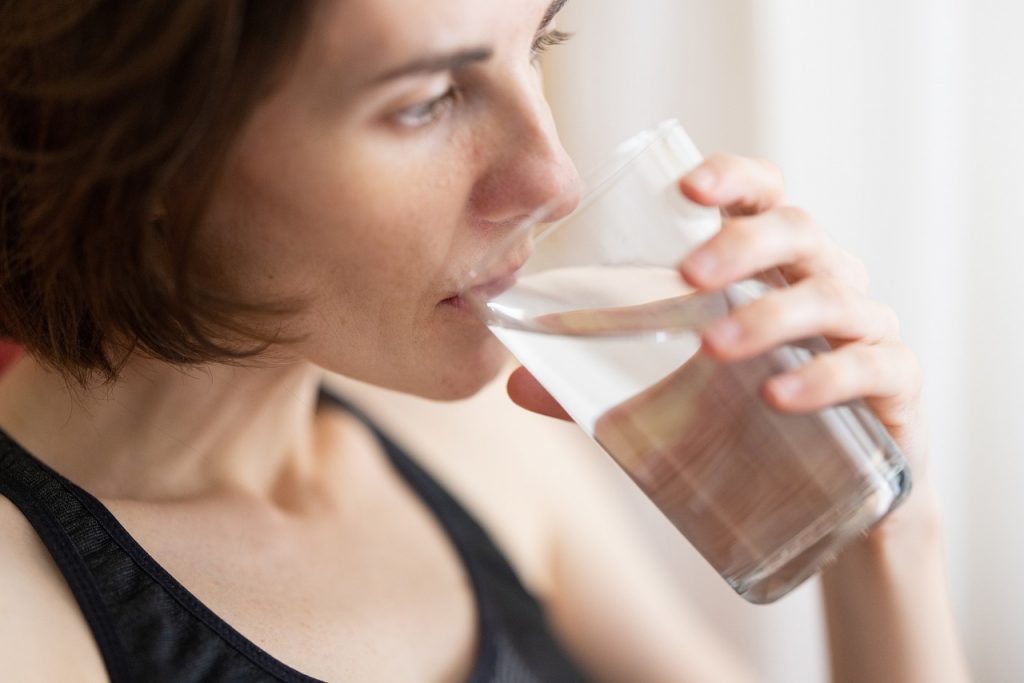I expect that like the majority of us, you’re not staying adequately hydrated. And that’s because most of us simply don’t drink enough water, which is arguably the most important thing that we consume. For instance, did you know that the human body can live without food for weeks — even months, in some cases. However, you wouldn’t be able to survive more than a handful of days without water, which makes up about 70-80% of our bodies. In fact, on a hot day the body can lose up to 1.5 ltrs an hour, which means you can become dehydrated a lot easier and faster than most people think.
I have a friend who’s a reflexologist and she confirmed to me that 99% of her clients are always dehydrated, even when they are aware that they should be drinking more water. And this is especially significant to women experiencing perimenopause and menopause, because these conditions can have even more significant effects on your overall wellbeing than commonly thought resulting from being dehydrated. That’s why in this blog, I’ll share with you some of the surprising symptoms that can either reveal themselves or worsen due to being dehydrated.
Menopause and Dehydration
For those who have been clients or following me for a while, then you’ll know the emphasis that I place on daily water intake, because it can remarkably alleviate numerous symptoms, including headaches, mental fogginess, memory lapses and even bloating. In addition, staying adequately hydrated is a remarkably simple step for you to include as part of your perimenopausal and menopausal self-care routine.
According to the Journal of Biological Chemistry, your skin comprises of 64% water, your muscles 79%, your lungs 83% and your bones 31%, while your brain and heart are made up with about 73% water. This means that it only takes you being dehydrated by just 2% before you’ll experience memory lapses and other cognitive dysfunction.
And besides the cognitive symptoms that I’ve mentioned above, being dehydrated can also trigger palpitations, dry skin, vaginal dryness and urinary tract infections during perimenopause and menopause, as well as the following unexpected signs:
1. High Blood Pressure
While elevated blood pressure levels are quite common among perimenopausal and menopausal women, being dehydrated exacerbates this scenario. That’s because if you aren’t sufficiently hydrated, it can reduce your blood volume, which makes it more difficult for your heart to circulate the blood effectively. This will potentially lead to hypertension. If you find yourself in this situation, ensure that you drink enough water throughout the day. You could also consider having a small glass of warm water right before bedtime, especially if you’re experiencing night sweats, in order to prevent morning blood pressure spikes.
2. Craving For Carbs
Do you have a raging sweet tooth? That’s because being dehydrated can cause you to have cravings for carbohydrates and sweets, particularly after you’ve done any physical exercise or exertion. This is because your body depletes stored glucose faster when it’s in a dehydrated state, so you should always make sure that you’re adequately hydrated both before and during any physical activity in order to avoid those annoying post-exercise sweet cravings.
3. Acid Reflux
Although this is one that you may not have considered, being dehydrated can also mimic symptoms of an over-acidic body, which can manifest as acid reflux. So, if you’re an acid reflux sufferer, you should make sure that you stay hydrated, particularly between and before meals, and then refrain from drinking cold beverages while eating, because these can impair your digestive system from working properly.
4. Red in the Face
If you experience persistent facial flushing, then this could be as a result from dehydration, which impacts your skin moisture levels, although other factors, including acne rosacea, could also contribute. When your body is dehydrated, blood vessels near the skin’s surface can dilate in an attempt to regulate your temperature. This dilation increases the blood flow to the skin, which can lead to flushing on the face. Dehydration can lead to decreased moisture levels in the skin, which will cause it to become dry, irritated and more prone to redness and inflammation, contributing to facial flushing. Your circulation can also be impaired through poor blood flow to the skin, which can exacerbate facial flushing by reducing the skin’s ability to regulate temperature and maintain its normal colour. And finally, dehydrated skin can become more sensitive to external factors such as sunlight, pollution and the harsh chemicals in conventional skincare products. This heightened sensitivity can trigger inflammatory responses in the skin, which includes flushing and redness.
5. The Eyes Have It
Perhaps surprisingly, dehydration can also affect your eye health, potentially causing blurred vision, dryness and sensitivity to light. Dehydration may exacerbate the progression and symptoms of macular degeneration, which is a common age-related eye condition menopausal women experience that is characterised by the deterioration of the macula, the central part of the retina responsible for sharp, central vision. Inadequate hydration can compromise your overall eye health, leading to dryness, irritation and reduced tear production. Dehydration can also exacerbate oxidative stress and inflammation in the eyes, so drinking enough water is essential for maintaining optimal eye function and may help mitigate the risk and severity of macular degeneration through adequate lubrication and minimising oxidative damage to the retina.
Practical Tips To Stay Hydrated
Apart from all the symptoms I’ve mentioned, if you have general fatigue and your urine is a deep yellow to orange colour or has a strong odour, then these also serve as indicators that you’re dehydrated. To stop this from occurring, you should prioritise your intake of fresh water throughout the day. And I don’t mean coffee, tea or fruit juice. If you don’t like the taste of water (yet!), then consider adding a slice of lemon, cucumber or a sprig of rosemary to give it a hint of flavour. Start paying attention to your body’s signals, adjust your hydration habits accordingly and it could impact your menopausal symptoms for the better.
Love, Gaynor x





